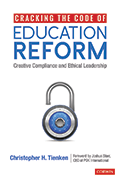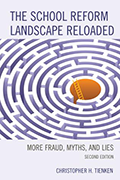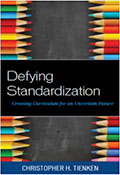Below are comments adapted from a presentation given on Oct. 26, 2014 at the Montclair Cares About Schools panel discussion on the responsibilities of school boards.
As I look out over the current school reform landscape I see it is categorized by policies that seek to standardize, homogenize, and corporatize public education through the use of one-size-fits-all curriculum standards, high stakes testing, micro-management of school operations from distal bureaucrats, teacher evaluation policies based on mis-interpretations of current research, and heavy reliance on corporate education providers camouflaged as non-profits operating via charter schools.
Bureaucrats across the country have put their faith in standardized programs. A command and control monitoring structure pervades many of these initiatives. The vendors and proponents of these types of policies do not seem to understand the complex nature of child development, classroom instruction, or learning.
The solutions to every perceived or claimed public education problem seem to revolve around standardizing teachers and children, closing public schools, giving away taxpayer resources like school buildings to charter schools, and stripping local control from community stakeholders. These solutions lack all semblance of empirical support.
Of course the genesis for all these solutions is the argument that the US public school system, the entire system of over 13,000 school districts and approximately 50 million students, is failing and causing students to become less globally competitive. Proponents of the current school reform agenda claim that because the US ranks at the middle of the pack on international tests, that somehow proves that US students are not prepared for the world or that they will be less economically competitive and cause economic doom for the country. Even the NJDOE uses the argument as one reason for their teacher evaluation system, the need for Common Core and their support of the PARCC test.
The only problem with that argument is that it does not hold up to empirical review. Rankings on international tests do not correlate to any important macro-economic indicators in the G20 countries, the largest economies on the planet. The G20 is the economic shark tank that we swim in. Perhaps more importantly, none of the rankings on international tests for the G20 group of nations relate to international indices of creativity, innovation, or entrepreneurship. For example, the US ranks 1st in the world in Nobel Prizes in the sciences and medicine. 60% of all Nobel Laureates come from US public schools.
The US ranks 1st in the world in the number of utility patents and the number of scientific papers produced. The US ranks 2nd in the world on the Global Creativity Index, 3rd on the Global Entrepreneurship and Development Index, and 5th on the Global Innovation Index. We rank in the top 10 in the industrialized world for the percentage of high school graduates and the percentage of our population with BA degrees. We produce the highest percentage of engineers who are qualified to work in multi-national corporations, we produce the greatest number of engineering doctorates, over 90% of which go to US born students, and the list of the accomplishments goes on. In short, the arguments that all these standardizing reforms are both necessary and will increase competitiveness and secure a vibrant macro-economic future rest on pillars of sand.
However, some boards of education are pushing back on the over-generalized claims and mythical stories put forth by education reformers regarding the efficacy of standardization and testing systems. The Bridgeport CT board of education pushed back against superintendent Paul Valles and his program of closing schools and increasing charters. Twenty-six school boards in Wisconsin banded together to send resolutions to their representatives about draconian cuts to public school budgets and the redirection of funds to charter schools.
The Lakeland School Board and Williamson County School Board in Tennessee both passed resolutions that called for ending use of the Common Core and petitioning the state for local control of curriculum standards. Similarly, the Gilbert School Board in AZ passed a resolution calling for the Governor to end the state’s participation in the Common Core and the regressive effects of standardized testing.
The Portland School Board in Oregon recently voted not to set state-mandated achievement compacts in three subject areas linked to the state’s new Common Core-aligned tests known as Smarter Balanced Assessment Consortium, known as SBAC. They recognized the narrow effects on learning that the Common Core and national testing schemes are having on their children. So too did the Palm Beach County School board in its resolution calling for a testing overhaul and less reliance on standardized tests.
Perhaps one of most widely publicized examples of school boards acting courageously to push back on some of these regressive policies comes from Texas where 520 boards of education and their superintendents fought the implementation of 15 end-of-course high school standardized tests that were part of a state education reform package. They got the number reduced to five.
And of course we have examples here in NJ of boards who have shown courageous leadership or who are trying to battle these corporate reforms, like places in Highland Park, Newark, Bloomfield, and others around the state.
But what are just a few of the things school boards in New Jersey should be concerned about? I’ve seen the control and decision making ability of local boards in NJ become increasingly muted and in some areas completed neutered since the inception of the No Child Left Behind Act and now with the Race to the Top, NCLB waivers, Common Core, and PARCC testing. For example, try going to your local school board to get wholesale changes to your mathematics program, both the scope of what is taught and the sequence of when topics are taught. Try to get things removed and or moved to other grade levels. You will be told that it is not possible due to state regulations, Common Core requirements, and/or PARCC testing. In many respects local school boards have been reduced to adopting state mandated policies and many of those policies are not good for children.
For example, education bureaucrats at the highest levels of the New Jersey Department of Education have said publically that the PARCC test is a test worth teaching too and that teachers should spend 180 days teaching the skills on the PARCC, as if there is nothing else to attend to. Testing is not learning, and test preparation is not teaching. Not one four-year college in NJ is willing to accept the results from the PARCC tests as an admissions indicator.
To proclaim that one test and one set of curriculum standards, the Common Core, can provide meaningful data about whether a child is college and career ready, that is, ready to attend one of the over 4,400 colleges and universities in the US or pursue one of the tens of thousands of careers that exist or those that don’t but will by the time this year’s preschool class, the class or 2029 or 2030 graduates high school, is educationally bankrupt. No test, not the ACT nor SAT, or any other test can tell you that. In fact, high school GPA is a better predictor of first year college success and college completion than either the SAT or ACT. Maybe that is why there are now almost 1,000 colleges and universities that don’t require either test or make it optional. But yet, NJ bureaucrats, some leaders of NJ professional education organizations, and some boards of education pursue PARCC testing and Common Core implementation with zeal.
You cannot standardize creativity, innovation, and entrepreneurship. What is being cut from schools now, because of this misguided adherence to standardization, are the subjects and experiences that children will really need to acquire the skills necessary to compete in a global economy in 2030.
Skills like collaboration, communication, strategizing, cooperation, empathy, compassion, leadership, cultural literacy, creativity, innovation, entrepreneurship, critical consumption of information, socially conscious decision-making, critical thinking, adaptability, flexibility, networking, resilience, persistence, and the list goes on. None of those skills are included in the Common Core or PARCC testing. Sure, the Common Core and PARCC use impressive prompts that require students to “analyze” and “infer” but when one examines those standards and questions in depth, one find that students are analyzing and inferring for one right answer. This is convergent thinking, not the divergent, open-ended thinking children need to be cognitively nimble.
Standardization also effects our teachers via the various evaluation and salary schemes currently in use. John Dewey warned us almost 100 years ago that it is a fool’s errand to expect creative, independent, and innovative work from students when their teachers are unemancipated and shackled by too many rules and prescriptions and too much of a desire for uniformity of method and subject matter.
Of course some NJ education bureaucrats and leaders of some of the professional organizations argue that the Common Core is not a curriculum, but that is simply not true. NJ explained in its round 3 Race to the Top application that all curricular programs in state schools will be aligned to the Common Core by this school year and that the 70 priority schools and many of the over 150 focus schools will use the NJ Model Curriculum and assessments, which in fact are just the Common Core repackaged. Furthermore, many districts are going to be very reluctant to make large additions to the their curriculum for fear of the students doing poorly on the PARCC test. Some district boards of education have even taken the action of approving pullout PARCC preparation programs for their students during the school day. What opportunities are those students missing?
So there is much for boards to educate themselves about and push back on in NJ. That is why I think the most important function of a school board now is to act in the best interest of children and to challenge bad policy making in their states. Not only challenge bad policy, but recognize it and help lead their schools and states away from it as opposed to not asking questions or simply “following orders” from the state department of education.
Another function of the board as I see it is as a formal decision making body that can give community members their democratic voice in the education of their children: Give them a voice from which to push back on bad policy. This voice has been a staple of American culture and the public school structure in this country. However, increasingly we see policy makers, departments of education, and pundits challenge the notion that local school boards are important and decry that boards should not have the final say in some of the meaningful aspects of education, like curriculum, assessment, and instruction.
But as I stated earlier, there are boards of education that choose to act courageously and support their community members, parents, students, teachers, staff, and other stakeholders in challenging the standardizing and privatizing of public education. In cases in which boards of education are less sensitive to the needs of stakeholders, stakeholders are pushing back through local elections. Although most school boards in NJ use a democratic system of elections, some still operate under a system of mayoral appointments. There are various reasons for this and those depend on the town.
For example, Montclair, NJ the history of the appointed board comes from the need to insulate previous school boards and school budgets from the politics surrounding the desegregation orders placed upon the district several decade years ago. The relatively new budget cap law has also changed the budget process and affected local dynamics, so school budgets under the 2% cap no longer have to be submitted for public vote. This further insulates boards from political pressures. So it may no longer be necessary to have an appointed board to avoid an annual budget referendum as it was in the past.
But regardless if the board of education is appointed or locally elected, local governments are the closest form of government to the people. Local government can be the most responsive to the needs and concerns of its citizens and local control is part of our cultural heritage.
Democracy deserves the chance to run its course and the decision making authority of boards should not be muted by state mandates and anti-local control legislation. Local decision-making allows for the unique local conditions and concerns and values about public education to be expressed. For example, magnet schools and integration are valued locally in Montclair and boards of education there made specific local decisions, years ago to support those values whereas neighborhood schools are preferred in other towns and are supported by their boards.
Likewise, stakeholders in some towns might decide that their local school administrators and teachers could create better curriculum standards than those aligned to the Common Core. Perhaps some boards of education might decide that their educators could design much more rigorous and authentic assessments like those designed by the New York Performance Standards Consortium. Curriculum, assessment, instruction, and overall accountability should ultimately be a local function and school boards should be advocating for such. They should stand up to bad policy and be open to evidence that runs counter to the current neo-liberal, privatizing and standardizing narrative.
Children do not have a seat at the policy making table and therefore their voice is limited. Boards of education must recognize bad policy and advocate on behalf of students. Boards must join parents, students, teachers, paraprofessionals and all those involved in public education to enlarge the voice of children in the policy arena.
REFERENCES
Tienken, C.H. (2014). Challenging Core assumptions: What does U.S. performance on international assessments tell us. In. K. Lombard (Ed.) Common ground on Common Core. (pp.31-51). Madison, WI: Resounding Books.
Tienken, C.H. & Mullen, C.A. (2014, August). The curious case of international student assessment: Rankings and realities in the innovation economy. In S. Harris & J. Mixon (Eds.), Building cultural community through global educational leadership (pp.146-164). Ypsilanti, MI: NCPEA Press.
Tienken, C.H. & Orlich, D.C. (2013). The School Reform Landscape: Fraud, Myth, and Lies. Lanham, MD: Rowman and Littlefield.
Tienken, C.H. (2014). Non-standard standards. Kappa Delta Pi Record, 50(2) 56-60.
Tienken, C.H. (2014). PISA problems. AASA Journal of Scholarship and Practice, 10(4), 4-14.
Tienken, C.H. (2014). Economic dominance with political incompetence. Kappa Delta Pi Record, 50, 9-12.
Tienken, C.H. (2013). International comparisons of creativity and innovation. Kappa Delta Pi Record, 49, 153-155.
Tienken, C.H. (2013). Neoliberalism, social Darwinism, and consumerism masquerading as school reform. Interchange, 43, 295-316. DOI: 0.1007/s10780-013-9178-y


